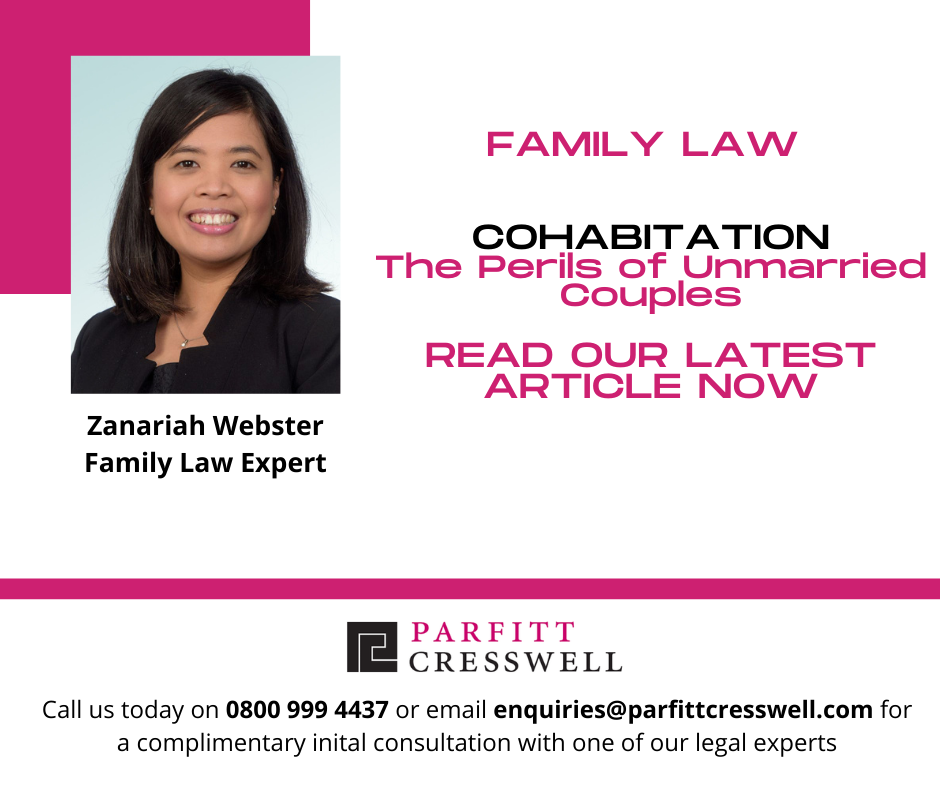The Perils of Unmarried Couples
Article updated: 6th September 2024
The number of cohabiting families in the UK has increased remarkably in recent years with the number of cohabiting couple families growing faster than married couple families. Data from the Office for National Statistics show that over the last decade there has been a significant increase from the traditional household of a married couple to cohabiting couples. This article seeks to address some of the common hurdles that cohabiting couples face even in the 21st century.
Outdated Marriage Law
Unfortunately, the law has not necessarily caught up with changes in society and upon a relationship breakdown, separating couples seeking redress do not have the benefit of relying on the Matrimonial Causes Act 1973 to protect their financial future. This is irrespective of the number of years a couple have remained together, the size of the assets they have built together or the number of children they have.
Common law marriages are a myth and moreover, families with children face greater uncertainty especially where one parent is the homemaker or on a low income. The Cohabitation Rights Bill has been making the rounds at parliament since 2013 but due to ongoing opposition, it is unlikely to gain any traction in the near future.
It is a rather unromantic notion that before any couple decides to cohabit, they put their affairs in order and ascertain ownership of property. However, it is simply a practical step in the event that the relationship breaks down.
There are several ways in which parties can protect their interests should they decide not to get married.
Firstly, they can enter into a Cohabitation Agreement, which sets out how they wish to split their property, contents, personal belongings or other assets. It is advisable that couples declare their assets and liabilities, and each seek independent legal advice when the agreement is drawn up to give the agreement weight if the matter was to go before a Judge. The agreement is a private agreement between the parties and is not always enforceable in Court however, in the event that proceedings were initiated the document can be used as evidence for the court to consider.
Secondly, when an unmarried couple purchases a property in unequal shares, they should have a Declaration of Trust setting out their respective shares. This not only provides them with certainty but if there was a dispute in the future, the Court can use the Declaration of Trust as proof of ownership. Without a Declaration of Trust, disputes can be very complex and highly subjective. The Courts will consider factors such as the parties’ intentions at the inception of the relationship to ascertain whether they intended the property to be a permanent family home.
If one party owns the family home and the other lives in the same property but contributed to the upkeep and renovations, it would be very difficult for that party to argue for a share of that property but having a Declaration of Trust will prevent this. It is tricky to broach this subject but by not having both names on the title deeds, you can potentially be left in a vulnerable position in the event of a breakdown.
In most cases, the family home is the parties’ largest asset and where they are unmarried and there is a dispute over ownership of the property, separating couples would need to make an application under the Trusts of Land and Appointment of Trustees Act 1996 (TOLATA). These types of applications are complex, and the Courts exercise a large amount of discretion in making any orders.
Children With Unmarried Parents
Having children is another factor that can leave an unmarried couple even more vulnerable. For example, if one party, usually the mother, gives up her work or career to raise the children and is dependent on her partner's income to maintain herself, she is not entitled to seek any form of maintenance for herself. In the event of a breakup, she would need to either seek the father's agreement to pay maintenance for the children or she would need to go through the Child Maintenance Service.
If a party wishes to make financial provision for their children, they can apply to the Court under Schedule 1 Children Act 1989. Under this Act, a parent can apply for periodical payments (i.e. monthly maintenance payments) lump sum orders, a variation of periodical payments or a property settlement or transfer. The significance of these applications is that any orders made are strictly for the benefit of the children and not as a “backdoor” route to the equivalent of spousal maintenance.
Finally, having a Will is another way a cohabiting couple can protect their assets. If one party is not on the title deeds, they do not have an automatic right of ownership to the property, which extends to any other assets that is owned by one party. Setting out your requirements in a Will provides certainty that your wishes and intents will be carried out.
Cohabiting couples fall under a myriad of laws that cover Family, Property and Wills. Before embarking on any significant purchase, such as property, it is best to seek advice to best protect your assets in case the worst happens. The Experts at Parfitt Cresswell have significant experience in these matters and can provide you with the solid and reassuring advice you need.
Legal Advice at Parfitt Cresswell
If you or a loved one is in need of legal advice in relation to any family law matter take advantage of our free initial, no obligation consultation where you can meet with one of our Family Law experts and find out what the next best course of action is for you and your family to secure your future. Be proactive and call us today or click on the button below to arrange your complimentary initial consultation. We are here to assist

